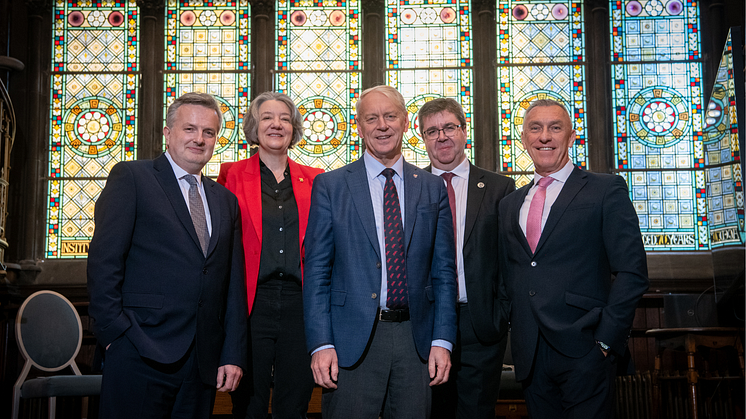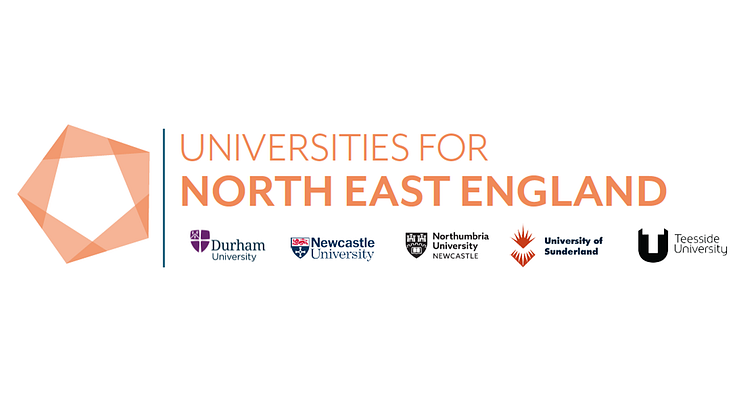
Press release -
North East universities respond to proposals for higher education reform
The five universities in North East England have responded to the UK Government’s priorities for higher education reform, indicating their commitment to work together and with others to accelerate economic growth in the region.
Speaking at a launch event for the newly formed ‘Universities for North East England’ (UNEE) partnership, the vice-chancellors of Durham, Newcastle, Northumbria, Sunderland and Teesside universities outlined their vision for greater collaboration to improve access for disadvantaged students. They also restated their commitment to community engagement, social responsibility, and fostering positive societal impact.
They outlined how working with the Tees Valley and North East combined authorities and other partners, they will be a unified voice of higher education in and for the North East of England, to support the region’s economic, social and cultural success.
The UNEE partnership embodies how universities are already addressing the Government’s priorities for higher education reform, which were outlined earlier this month as being expanding access and improving outcomes for disadvantaged students, economic growth, civic and regional engagement, teaching, and efficiency.
In a joint statement, the vice-chancellors of the five universities said: “We welcome the Government’s commitment to putting our world-leading higher education sector on a secure footing and delivering even greater value for money for UK taxpayers.
“As five independent institutions, we each bring unique strengths to the region. By working even more collaboratively through Universities for North East England, we will forge deeper connections with businesses and local communities to help unlock the full potential of our region and beyond.”
On economic growth, recent analysis indicates that in the 2021-22 academic year alone the five universities in the region contributed £9.7 billion to the UK economy, a higher output per institution than any other region in the UK.
Northern Accelerator, an existing collaboration between the universities, is already speeding up the commercialisation of research in the North East and has so far supported the launch of more than 50 spin out businesses. In addition, graduates of universities in the North East launched 129 start-up companies with an annual turnover of £543 million in 2022–23 alone, employing more than 3,800 people.
The universities have also been central to the development of the North East Investment Zone, a £160 million scheme to unlock growth across ‘clean energy and green manufacturing’ businesses through a ten-year programme.
On access, the five universities have supported more than 30,000 young people each year to gain information, advice and guidance to progress to university through the decade-long ‘North East Raising Aspiration Partnership’. Yet the North East of England still has lower progression rates to higher education than the national average. It was announced at the event that the scheme will be relaunched as ‘Access – Universities for North East England’, with a renewed focus on improving participation in higher education for young people from the region. It will also continue to provide bespoke support for care-experienced students through the Regional Care Leaver Covenant.
On civic and regional engagement, the UNEE partners play a key role in making the North East a great place to live, study, work and invest through engagement in culture and sport, student volunteering and attracting thousands of international students adding to our region’s cultural diversity and global connections.
Universities are key in delivering a highly skilled and innovative workforce who will grow the North East’s key industries, such as green energy, advanced manufacturing, culture and creative, life sciences and digital. Between 2021 and 2026, the five universities will train around 11,000 nurses, 4,000 doctors and 8,000 teachers, many of whom will stay in the region and support its healthcare and education systems. Recent analysis from Universities UK estimates that by age 30, graduates in North East England earn a third more (34 per cent) than non-graduates who could have gone to University, further supporting the prosperity of the region.
On teaching, the UNEE partners renewed their commitment to delivering a world class student experience and preparing graduates with the skills needed to succeed in the workforce of the future. And on efficiency, the partners outlined how they will contribute to national discussions on sustainability and reform in higher education.
The launch event was held in Newcastle and was attended by representatives of the North East and Tees Valley Combined Authorities, as well as business leaders and policymakers.
North East Mayor Kim McGuinness commented: “Our five universities play a key role in the success of our region and of people who live, work and study here.
“This new partnership will ensure the North East's higher education institutions are in an even stronger position to attract further regional inward investment, build our businesses, drive growth and create jobs now and in the future.”
Tees Valley Mayor Ben Houchen said: "The North East’s universities are vital to our region’s success, driving economic growth through world-class innovation.
"This new partnership is a great step forward. By strengthening this partnership, the North East will benefit from a strong unified voice that will be heard on both the national and international stage.
"I fully support this commitment to joined-up thinking, and I’m eager to work closely with the partnership to deliver even more opportunities and benefits for Teesside, Darlington and Hartlepool."
<ENDS>
Notes to editors
About Universities for North East England
Universities for North East England is a collaboration between Durham, Newcastle, Northumbria, Sunderland and Teesside Universities, working alongside the Tees Valley and North East Combined Authorities. It aims to speak in a unified, place-informed voice to make higher education accessible for study, business, innovation, and investment, as well as offering regional insight to help inform national Higher Education policy.
Background statistics
- The total impact of universities in the North East of England on the UK economy in £9.7bn. This figure aggregates the benefits from research, knowledge exchange, teaching and learning activities, as well as institutional expenditure and education exports. Source: The economic impact of higher education, teaching, research and innovation. Universities UK, September 2024.
https://www.universitiesuk.ac.uk/what-we-do/policy-and-research/publications/economic-impact-higher-education - Graduates of universities in the North East launched 129 start-up companies with an annual turnover of £543 million in 2022–23 alone, employing more than 3,800 people. Source: Generating growth and opportunity in the North East. Universities UK, July 2024.
https://www.universitiesuk.ac.uk/sites/default/files/field/downloads/2024-07/generating-growth-and-opportunity-north-east-07-24.pdf (pdf). - Between 2021 and 2016, the North East’s five universities will train around 11,000 nurses, 4,000 medics and 8,000 teachers, many of whom will stay in the region and support its healthcare and education systems. Source: Universities and the UK’s economic recovery: an analysis of future impact. Universities UK, August 2021. https://www.universitiesuk.ac.uk/sites/default/files/field/downloads/2021-08/uuk-getting-results.pdf
- By age 30, graduates in the North East earn a third more (34 per cent) than non-graduates who could have gone to University. Source: Graduate employment and outcomes across regions and industries. Universities UK, November 2024.
[Link available from Thursday 21 November]
Links to additional information
Northern Accelerator - https://northernaccelerator.org/
North East Raising Aspiration Partnership - https://www.nerap.ac.uk/
North East Investment Zone - https://investnortheastengland.co.uk/north-east-investment-zone/
Topics
Categories
UNIVERSITY OF THE YEAR 2022 (Times Higher Education Awards)
Northumbria is a research-intensive university that unlocks potential for all, changing lives regionally, nationally and internationally.
Two thirds of Northumbria's undergraduate students come from the North East region and go into employment in the region when they graduate, demonstrating Northumbria's significant contribution to social mobility and levelling up in the North East of England.
Find out more about us at www.northumbria.ac.uk
--- Please contact media.communications@northumbria.ac.uk with any media enquiries or interview requests ---












